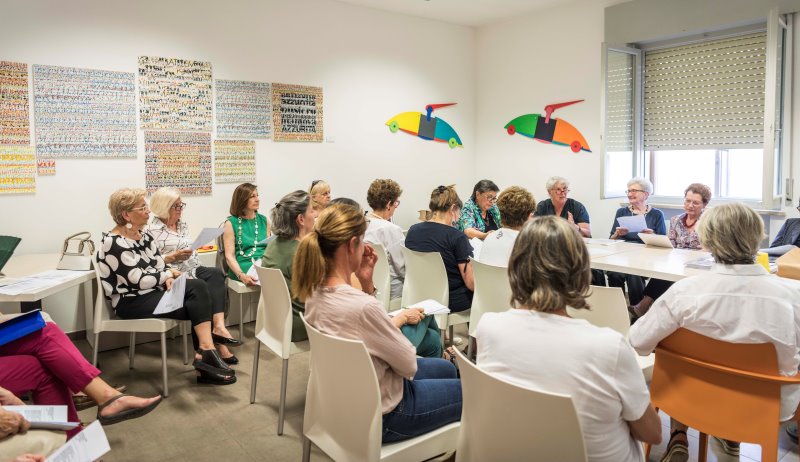The phenomenon of domestic violence is unfortunately spreading in many Italian cities and even in Mantua there are numerous reported cases. It is increasingly necessary to know how to intercept these women victims of violence and to be able to listen and receive them appropriately. Overcoming this trauma is possible as well as recovering self-confidence and rebuilding their own autonomy.
ItalyWith the CAV against Domestic Violence
A project to support women victims of domestic violence through the formation of host center workers and the creation of personalized start-up paths to autonomy.

- PlaceMantua
- PartnerMantua Life Help Center
- BeneficiariesCenter volunteers and women welcomed
- Period2014 – 2022
- Budget162.000€
The context
What is CAV
The Mantua Care Center (CAV) responds to the phenomenon of gender violence by promoting a listening and reception desk for women victims of abandonment, mistreatment or violence reported by social services, the Province, the Questura or other associations operating in the territory. Listening to the need, it follows the elaboration of a personal project that can include support and protection through reception in CAV housing or other facilities.
Training volunteers in the center
Over 30 volunteers work inside the listening desk who welcome women who come to the Center. This work, very demanding from a human and psychological point of view, needed support in terms of training that the Marcegaglia Foundation decided to finance. Starting from 2014, the volunteers participate in a training course that has allowed them to build an effective work group and to acquire new techniques and tools for managing the interview and the related emotional load. 20 of them also obtained the first level qualification of Counselor.
The path continues annually with these objectives: to acquire and enhance the basic skills of counseling, i.e. effective listening, communication, interview management, development of empathy and learning to manage one’s emotions and to acquire empowerment strategies and techniques, all supported by continuous supervision, individual and group, both in the presence and with simulation of cases.
Reception and support for women victims of violence
Every year at the CAV in Mantua, about 70 women are welcomed and listened, taken in charge with psychological and legal support services, intercultural mediation and recreational and scholastic support for children.
After the listening phase, in many cases, a reception phase in a protected structure and the definition of an autonomy recovery project are required. Some women are therefore welcomed in the shelter built in 2014 also thanks to the contribution of the Foundation. The stay in this structure, equipped with 10 protected accommodations, is temporary and for this it is necessary to build a personalized path with each woman that will lead them to regain housing and economic autonomy.
For this reason, the Foundation supports the activation of home and work skills and a series of related and fundamental activities for the welcomed women: legal and psychological consultancy, nursery and after-school activities for children aged 6 to 10. Over the years, the literacy course for foreign women and the writing and sewing workshop have also been strengthened.
The project continues
In 2019, over 70 women were welcomed and listened to at the CAV of Mantua, 52 of whom were taken care of with psychological, legal, intercultural mediation and housing services at the refuge house. The training of volunteers also continued for the sixth consecutive year. The training of the counselor Manuela Baiocchetti was aimed at integrating new volunteers into the working group and supporting the workers with the supervision tool.
In 2020, the limitations imposed by the Covid-19 pandemic had repercussions on the training and listening activities of the CAV. However, an online space for listening, sharing and support was created for the volunteers, which many experienced as an anchor and a chance to get out of the forced isolation of the lockdown. Thanks to this support, the volunteers were able to react and get back into the game to support in turn the women beneficiaries of the Center with concrete activities of distribution of basic necessities and remote listening.
We need your help
Having a home for yourself and your children is often a necessity for women who are victims of violence. At first, however, it may be difficult to sustain a rent, when you do not have a job yet and with dependent children. Thanks to your donation, we help secure a home to the CAV beneficiaries that start to become independent.
Specific donation for this project
